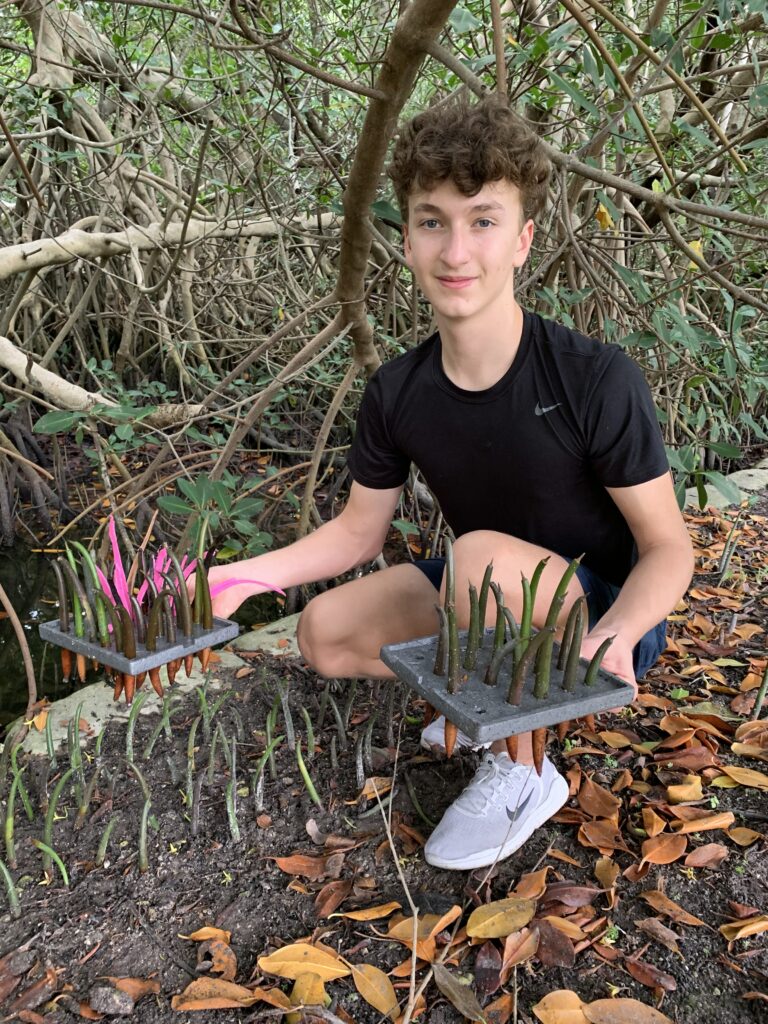By Will Charouhis, We Are Forces of Nature
Miami is a beautiful city, and I’ve grown up with the incredible opportunity to spend my free time fishing and freediving the reefs off the Florida coast. But it’s the mangrove swamps that are my playground – and they drive my action.
A little over a century ago, Miami was a mangrove swamp. But we’ve now paved over 90% of it in the name of development. And this isn’t just a Miami story. Six hundred million people living along the world’s coastlines are exposed to the perils of sea rise and global warming. Mangroves once provided protection, covering 75% of those coastlines. But scientists estimate that in the past 50 years alone, half the world’s mangrove cover has been lost.

So why does this all matter? I had the opportunity to take my best shot at answering that question as the closing speaker on day one of this month’s Southeast Florida Regional Climate Leadership Summit. The summit, bringing together 900 government, business and nonprofit officials from across the state and country, convened at the Miami Beach Convention Center to take a hard look at the problems South Florida is facing as climate collapse descends upon us, and the solutions our leadership and others are putting into play to ensure Miami remains the beautiful place it is today.
I started restoring mangroves to protect Florida’s coast from erosion after Hurricane Irma flooded our city in 2017. But scientists have now determined that the greatest threat to humanity is not sea rise. It’s the heat.
One answer to global warming lies in nature. Plants have been sequestering carbon out of the atmosphere for 3 billion years. If we can foster that, we can break the heat – and save humanity. And it turns out that the massive root systems of mangroves sequester carbon better than any tree on Earth!
My goal is to use my research at my “A Million Mangroves” lab to increase carbon sequestration, and to get 1 million mangroves in the ground by 2030. So far, we’ve restored six miles of mangroves along the coast, planted 2,289 mangroves, distributed 900 plants and educated 2,800 youth across Miami – and in 16 countries around the world – on this solution.
But the real solutions come with scale. So I’ve taken the opportunity to share my “A Million Mangroves” initiative at United Nations climate conferences in Madrid, Glasgow and Stockholm. Already, we’ve drawn in partners in Gabon and Cameroon. These are places that rely on mangroves for their very survival.
It is impossible for our unnatural industrial civilization to avoid great disruption to the natural earth. Our progress, much celebrated, was never going to go unchecked. Nothing in life ever does.
At this point, it is too late to avoid degradation of our environment and loss of some of our population due to climate change. But the best news I heard out of Miami’s Climate Leadership Summit – the message of hope – is this: While it is too late to stop climate change, it is not too late to slow it. Every action we take will slow the effects of global warming incrementally, giving us time to adapt to the changes and therefore a better chance for survival.
The question is whether civilization has what it takes to make it through the inevitable change to our planet. I hope so, but I guess we’ll see pretty soon: 197 countries will try to answer that question when the United Nations World Climate Conference (COP28) kicks off this week in Dubai. With 600 million lives hanging in the balance, we don’t have time to lose.
Will Charouhis is the founder of We Are Forces of Nature, a nonprofit working to halt climate change. Will can be reached at volunteer@weareforcesofnature.org or on X/Twitter at @WCharouhis.
If you are interested in submitting an opinion piece to The Invading Sea, email Editor Nathan Crabbe at ncrabbe@fau.edu. Sign up for The Invading Sea newsletter by visiting here. Watch the video below to find out more about Will Charouhis‘ “A Million Mangroves” project.



